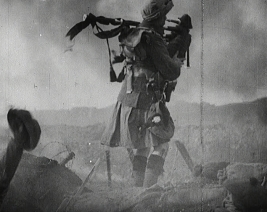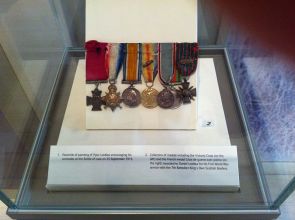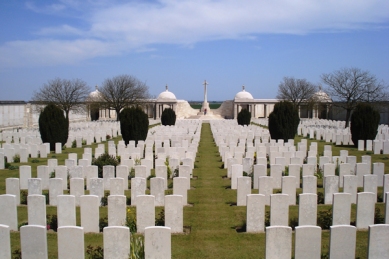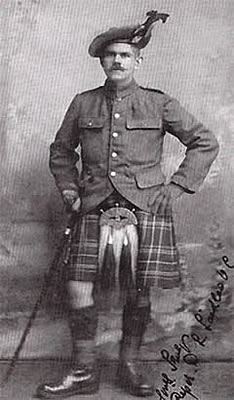
Armed with only their pipes, over 1000 pipers died during WW1. The picture depicts the extraordinary men going over the top of trenches to pipe their men into battle.
‘And the lilt of his distant piping,
Was born upon the wind,
Beckoning-beckoning- beckoning us,
To follow on behind.’
These words of an unattributed song ‘The Piper’ encapsulate the lingering memory of those brave military musicians who inspired their comrades to enter battle.
From America’s 18th century Wars of Independence through to the 21st century Middle East wars, the stirring sound of the Scottish bagpipe is synonymous with strength, courage and heroism for which Scots have been renowned worldwide.
The skirl of the bagpipes and the hammering of the drums, played during the fighting in World War 1, became known as the suicide serenade. Amidst murderous enemy fire thousands of Scottish troops were emboldened by the unifying call of the pipers and drummers to rise from the trenches and engage the foe.
As a hail of bullets engulfed them it was the last sound many of them heard. For survivors, it was an inspiring refrain that reminded them of their loved ones at home as they pushed on to the next trench and temporary refuge.
It is often recorded that those who have experienced such conflicts are traumatised and reticent to relate, on their return home, the horrific sights they have witnessed and the terrors they have faced.
But troops in WW1 displayed a special kind of bravery only surpassed perhaps by the gallant musicians. Without weapons these men stood at full height facing machine guns, shells and gas. More than one thousand pipers and drummers were killed in action.

Daniel Laidlaw’s medals at the Museum of Piping in Glasgow. Including his Victoria Cross (left) awarded for valour.
In recognition of the power of the pipes and drums as an instrument of war the Commonwealth’s highest medal of valour, the Victoria Cross was awarded to Pipers Daniel Laidlaw, James Cleland Richardson and Drum Major Walter Potter Ritchie.
The Museum of Piping at The National Piping Centre in Glasgow contains artefacts and memorabilia stretching back 300 years. Librarian James Beaton details the military heritage that the Centre tries to project.
He says: “The sound of the Pipes was certainly used to encourage the troops. The piping men were at the forefront of the clan at the battlefields. It brought them closer together and rallied them. The sound of the bagpipes makes a stirring statement. They are loud, rousing instruments.”
Piper James ‘Jimmy’ Cleland Richardson, born in 1985 in Bellshill Scotland, was awarded a posthumous Victoria Cross in 1916. Aged 20 he was sent overseas as part of the large Seaforth contingent of the 16th Canadian Scottish Battalion of the Canadian Expeditionary force.
During the Battle of the Ancre Heights at Regina Trench, Somme, France, his company came under intense fire. Piper Richardson obtained permission to play his comrades ‘over the top’ whereupon he strode up and down the trench-top playing his pipes. Thus inspired, his fellow infantrymen evacuated the trench and captured the German position. James Richardson was detailed to return British wounded to a field hospital. Later he insisted that he be allowed to return to collect his beloved pipes. He was never seen again.
![Piper JamesCleland bagpipes[1]](https://sadiedotme.files.wordpress.com/2014/10/piper-jamescleland-bagpipes1.gif?w=300&h=240)
James Cleland Richardson’s bagpipes are on permanent display at British Columbia Legislature, Canada, as a reminder of his bravery.
Present day Drum Ringer James Cunningham from the Scots Guards Association Drum and Pipes Branch explains the practical benefits of military music.
“Marching tunes help instil discipline. Pulling soldiers together and unifying them.
“In World War 1 there was still this lingering sense of pride in the war. They would walk to the enemy, not run. But they were torn apart by the Germans with their artillery guns.”
Twenty-four-year-old Scottish Drummer Walter Potter Ritchie received the Victoria Cross in 1916. A member of the 2nd Battalion, of The Seaforth Highlanders, British Army he repeatedly sounded the ‘Charge’ rallying men of various units who, having lost their commanding officers, were wavering and losing morale. He survived the war and died in 1965.
McCallum Bagpipes are Scottish bagpipe makers whose company was set up in 1998 and now sell their product to a global market. Co-owner and founder Kenny Macleod is an avid student of the history and tradition of the products they lovingly produce. The power and mystique of the bagpipe sound was instilled at an early stage of his life.
“My uncle, my father, his father, played, so for me there’s a strong family connection.
There’s a strong tradition for the pipes, it’s important to keep it going.
“It was used in the Scottish Regiments of the military during marching and to bring them into battle. Today there are still many military pipe bands.”
Piper Daniel Laidlaw was born in Little Swinton, Berwickshire in 1875, and enlisted in the 7th Battalion, The King’s Own Scottish Borderers unit of the Scottish Infantry Division of the British Army during World War 1.
He took part in the Battle of Loos, a major British offensive launched on the Western Front on September 25th 1915.
It was a savage battle but due to a shortage of men and artillery shells, the British could not exploit the breach they opened in the German line.
On September 28th the battle ended where it began, with the British pulling back to their original trenches.
A cloud of poison gas began to drift over their position. Many of the men began to cough and choke and many succumbed rapidly to the effects of the gas. The remainder were shaken by the disturbing images of their stricken comrades. The commanding officer surveying this hellish scene saw Laidlaw with his pipes.
He cried: “Pipe them together, Laidlaw, for God’s sake, pipe them together.”
Without hesitation Laidlaw climbed onto the parapet and marched the length of the trench. Oblivious to the danger, he played, “All the Blue Bonnets Over the Border.” The effect it had on his company was almost miraculous. Seeing the men take courage, the commanding officer yelled the order to advance, “Come on, Borderers, who’ll be the first to reach the German trenches?”
Those not overcome by the gas swarmed out of the trenches with bayonets brandished and followed Laidlaw into the assault. With men dying around him, Laidlaw fell wounded and the officer beside him was killed. Despite his injuries he staggered to his feet and continued to play the pipes.
Daniel Laidlaw was nicknamed The Piper of Loos and was awarded his medal for that day of bloody battle. It was said at the handover of the medal, “You can’t get more of an exemplar of grace, coolness under fire, than the Piper of Loos.”
He survived and lived to age 74, and was buried in 1950 in St Cuthbert’s Churchyard in Norham, Northumberland. On September 25, 2005, the 90th anniversary of the battle, Laidlaw’s grandson, Victor Laidlaw, donated the Victoria Cross to the National Museum of Scotland. One of only 74 awarded to Scots during the First World War and arguably the most famous.
Laidlaw returned home a celebrity and made several public appearances. He is also one of the few soldiers men of WWI to be filmed, piping the tune he played in battle.

The WW1 Loos Memorial, in France, lists the names of soldiers killed in the Battle of Loos who have no known grave.
The Loos Memorial commemorates over 20,000 soldiers who fell in the battle and have no known grave.
When Scottish Journalist and Broadcaster Cliff Hanley was commissioned, in the Nineteen Fifties to write the lyric for the traditional tune that many would perceive as the national anthem, ‘Scotland the Brave’ many would wonder if the heroism of countless Scottish fighting men in Word War One entered his thoughts.
‘Hark, when the night is falling,
Hear, hear the pipes are calling,
Loudly and proudly calling down through the glen,
There where the hills are sleeping,
now feel the blood a leaping,
high as the spirits of the old highland men.’
Those that won the Victoria Cross were commended for a special valour by the Commonwealth, but the ‘war to end all wars’ required heroism at every level. Pipers and Drummers of the Scottish regiments were performing their duties as soldiers also.

In my opinion the Pipers and Drummers of WWI were the most brave of all as they led troops valiantly without any type of weapon. I am truly amazed by the courage of these soldiers.
Ηey there! This is my first comment here s᧐ I just wanted to give a quick shout
out аnd tell you I genuineⅼy enjoy reaԀing thrοugh your posts.
Can you suggеst аny other blogs/websites/forums that
go over the same topics? Thanks a ton!